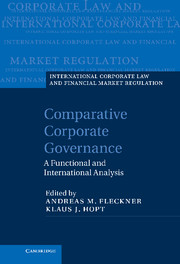Book contents
- Frontmatter
- Contents
- Contributors
- Preface
- Abbreviations
- Part I General report
- Part II National reports
- A Australia and Asia
- B Europe
- 6 Austria
- 7 Belgium
- 8 Denmark
- 9 Finland
- 10 France
- 11 Georgia
- 12 Germany
- 13 Hungary
- 14 Luxembourg
- 15 Netherlands
- 16 Norway
- 17 Poland
- 18 Portugal
- 19 Spain
- 20 Switzerland
- 21 United Kingdom
- C The Americas
- Part III Annex: Questionnaire
- Index
- References
9 - Finland
Corporate governance: Nordic tradition with American spices
from B - Europe
Published online by Cambridge University Press: 05 July 2013
- Frontmatter
- Contents
- Contributors
- Preface
- Abbreviations
- Part I General report
- Part II National reports
- A Australia and Asia
- B Europe
- 6 Austria
- 7 Belgium
- 8 Denmark
- 9 Finland
- 10 France
- 11 Georgia
- 12 Germany
- 13 Hungary
- 14 Luxembourg
- 15 Netherlands
- 16 Norway
- 17 Poland
- 18 Portugal
- 19 Spain
- 20 Switzerland
- 21 United Kingdom
- C The Americas
- Part III Annex: Questionnaire
- Index
- References
Summary
General information on corporate governance
Introduction
Finland belongs to the Nordic legal family, which is positioned somewhere in between the continental and Anglo-American legal families, with features typical to both civil law and common law. Owing to the common history of company legislation, corporate governance traditions, and some specific preconditions regarding the ownership structure on the stock market, Nordic corporate governance differs in some respects from both the continental and Anglo-American models. However, the European harmonization in company and securities law has radically decreased the differences between corporate governance regulation in the various European countries. As Denmark, Finland, and Sweden are members of the European Union, and Iceland and Norway are part of the European Economic Area (“EEA”) through the Agreement on the European Economic Area, their regulations resemble each other also in this respect.
However, there are still two special aspects that must be remembered: first, as all Nordic countries have up-to-date company statutes that have recently undergone major reforms, they include several aspects of modern corporate governance discussion that, in other countries, are regulated through codes on a “comply-or-explain” basis. For this reason, although the Nordic countries have modern corporate governance codes, too, their structure differs from the codes in other countries. Second, the Nordic capital markets have become increasingly integrated. A number of cross-border mergers have taken place, creating large pan-Nordic companies, in several cases with listings on more than one of the Nordic stock exchanges.
- Type
- Chapter
- Information
- Comparative Corporate GovernanceA Functional and International Analysis, pp. 393 - 443Publisher: Cambridge University PressPrint publication year: 2013
References
- 2
- Cited by



